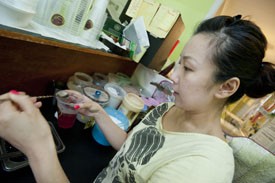Iris Chang’s thriving café’ introduced New Brunswick to Taiwanese beverage
You can’t burst Iris Chang’s bubble. In 2001, she opened the first bubble tea cafe in New Brunswick, but unfortunately the city wasn’t ready for oohlong spiked with tapioca balls.
“Nobody knew what bubble tea was,’’ says Chang, a Rutgers alumna who owns I’s Cafe on Easton Avenue. “And people were scared of the tapioca. The balls kind of looked like frog eggs. And the fact that they’re chewy -- people aren’t used to having chewy things in drinks.”
But Chang refused to quit, working three part-time jobs until she could afford to run the cafe full time. She was convinced that bubble tea would go mainstream -- and it did. But that took awhile. “I would wonder, if it’s so popular in Taiwan, why does no one like it here?’’ asked Chang, who is Taiwanese.
When Chang began mixing tea and bubbles into smoothies and faux-frappucinos, business finally picked up.
Now there are several bubble tea shops on Easton Avenue and the beverage is trendy.
Bubble tea was popularized in Taiwan during the 1980s and then caught on internationally. It’s made with tea, soy or almond milk and sometimes juice. The bubbles, or “boba,” sink to the bottom of the cup and are occasionally dyed different colors or molded into shapes. (“We have gummy-worm shaped bubbles!” boasts a sign on the café’ wall.)
Chang – who prides herself on making her own bubbles, unlike some cafe owners – carries a few kinds: dark, chewy “traditional’’ bubbles, bubbles made from aloe vera and pale bubbles that squirt juice when bitten. The tea is sipped through an extra wide straw so the bobas can be easily vacuumed up.
Opening the shop was initially Chang’s fall back career. After graduating in 2000, Chang, a native of Taiwan who moved to Hillsborough in middle school, had trouble getting a job as a teacher because of the slow economy.
On a visit to her homeland, she became addicted to bubble tea and decided to introduce th

e treat to New Brunswick. “I thought, ‘this is amazing.’ How come no one knows about it? Feeling so attached to Rutgers, I wanted to open my shop here and bring students more culture and variety,’’ she says.
As the café’s owner, Chang has learned to market her product, filling her shop with colorful signs advertising specials and top 10 lists, which include “black tea ice cream shake;” “red bean coconut ice cream shake’’‘ and “rose lychee smoothie.’’
She likes to inform customers that the drinks are all less than 30 calories, and she’s evangelical about the benefits of tea: its antioxidants, metabolism-boosting properties and the fact that it has less caffeine than java. “I think tea is going to overtake coffee,’’ she says with certainty.
Chang refuses to sell coffee. Last week, she gently turned away a man who asked for a cup. But there’s always a steady demand for tea. Although summers are slower for Chang, a stream of customers filed in on a recent weekday afternoon.
Lately, Chang has been branching out beyond tea by selling home-made French macaroons and “cake pops,” round bites of cake on a stick.
Bubble tea, however, is still her main business and she hopes someday to have a chain of cafes.
It’s hard to doubt her.
“I still drink my bubble tea every day when I come to work,’’ she says. “I have a passion.’’